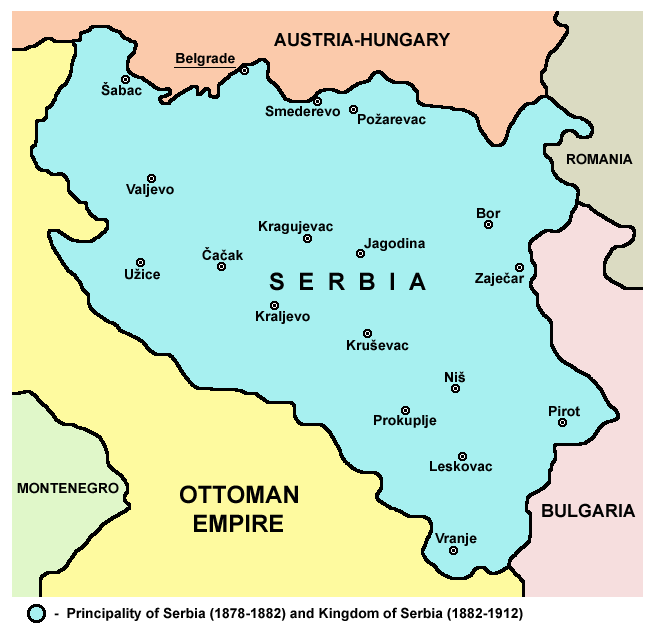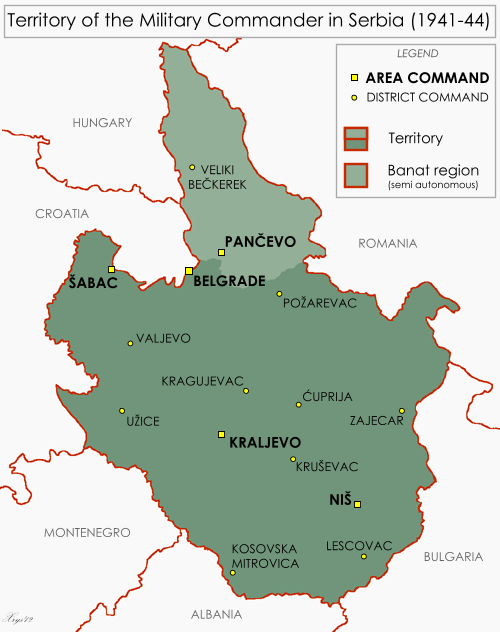|
Commissioner Government
The Commissioner Government (, ''Komesarska vlada'') was a short-lived Serbian collaborationist puppet government established in the German-occupied territory of Serbia within the Axis-partitioned Kingdom of Yugoslavia during World War II. It operated from 30 April to 29 August 1941, was headed by Milan Aćimović, and is also referred to as the Commissars Government or Council of Commissars. Of the ten commissioners, four had previously been ministers in various Yugoslav governments, and two had been assistant ministers. The members were pro-German, anti-semitic and anti- communist, and believed that Germany would win the war. The Aćimović government lacked any semblance of power, and was merely an instrument of the German occupation regime, carrying out its orders within the occupied territory. Under the overall control of the German Military Commander in Serbia, supervision of its day-to-day operations was the responsibility of the chief of the German administrative staff, ... [...More Info...] [...Related Items...] OR: [Wikipedia] [Google] [Baidu] |
Territory Of The Military Commander In Serbia
The Territory of the Military Commander in Serbia (german: Gebiet des Militärbefehlshabers in Serbien; sr, Подручје Војног заповедника у Србији, Područje vojnog zapovednika u Srbiji) was the area of the Kingdom of Yugoslavia that was placed under a military government of occupation by the Wehrmacht following the invasion, occupation and dismantling of Yugoslavia in April 1941. The territory included only central Serbia, with the addition of the northern part of Kosovo (around Kosovska Mitrovica), and the Banat. This territory was the only area of partitioned Yugoslavia in which the German occupants established a military government. This was due to the key rail and the Danube transport routes that passed through it, and its valuable resources, particularly non-ferrous metals. On 22 April 1941, the territory was placed under the supreme authority of the German military commander in Serbia, with the day-to-day administration of the territory u ... [...More Info...] [...Related Items...] OR: [Wikipedia] [Google] [Baidu] |
Army General (Kingdom Of Yugoslavia)
Army general ( hbs-Latn, Armijski đeneral) was a military rank of the Kingdom of Serbia and later Kingdom of Yugoslavia. Established in 1900, it was abolished for some period after 1901, but it was again created in Kingdom of Yugoslavia after 1918 as Kingdom of Serbia passed along insignia and military ranks to newly named state. It was a high rank for Yugoslav generals, inferior only to the ''Vojvoda''. Yugoslav army generals commanded armies, group of armies and held position of Deputy Commander in Chief of the Yugoslav Armed Forces, Chief of the Royal Yugoslav Army Air Force and Chief of the General Staff of the Royal Yugoslav Army. It was adopted and based on the similar French "commandant d'armée" later known as "général d'armée " - Army general. Promotion and use This rank was usually given to Kingdom of Yugoslavia senior officers in the Ministry of Defense and General Staff and also used to promoted division generals under Law on the Organization of the Army and Navy f ... [...More Info...] [...Related Items...] OR: [Wikipedia] [Google] [Baidu] |
Oberkommando Des Heeres
The (; abbreviated OKH) was the Command (military formation), high command of the German Army (1935–1945), Army of Nazi Germany. It was founded in 1935 as part of Adolf Hitler's German rearmament, rearmament of Germany. OKH was ''de facto'' the most important unit within the German war planning until the Battle of Moscow, defeat at Moscow in December 1941. During World War II, OKH had the responsibility of strategic planning of Field army, Armies and Army Groups. The General Staff of the OKH managed operational matters. Each German Army also had an Army High Command ( or AOK). The Armed Forces High Command () then took over this function for theatres other than the Eastern Front (World War II), Eastern front. The OKH commander held the title of Commander-in-chief of the Army (). After the Battle of Moscow, the OKH commander Field marshal Walther von Brauchitsch was removed from office, and Hitler appointed himself as Commander-in-Chief of the Army. From 1938, OKH was, togeth ... [...More Info...] [...Related Items...] OR: [Wikipedia] [Google] [Baidu] |
Salonika
Thessaloniki (; el, Θεσσαλονίκη, , also known as Thessalonica (), Saloniki, or Salonica (), is the second-largest city in Greece, with over one million inhabitants in its metropolitan area, and the capital of the geographic region of Macedonia, the administrative region of Central Macedonia and the Decentralized Administration of Macedonia and Thrace. It is also known in Greek as (), literally "the co-capital", a reference to its historical status as the () or "co-reigning" city of the Byzantine Empire alongside Constantinople. Thessaloniki is located on the Thermaic Gulf, at the northwest corner of the Aegean Sea. It is bounded on the west by the delta of the Axios. The municipality of Thessaloniki, the historical center, had a population of 317,778 in 2021, while the Thessaloniki metropolitan area had 1,091,424 inhabitants in 2021. It is Greece's second major economic, industrial, commercial and political centre, and a major transportation hub for Greece and south ... [...More Info...] [...Related Items...] OR: [Wikipedia] [Google] [Baidu] |
Banat (1941–1944)
The Banat was a political entity established in 1941 after the occupation and partition of Yugoslavia by the Axis Powers in the historical Banat region. It was formally under the control of the German puppet Government of National Salvation in Belgrade, which theoretically had limited jurisdiction over all of the Territory of the Military Commander in Serbia, but all power within the Banat was in the hands of the local minority of ethnic Germans (''Volksdeutsche''). The regional civilian commissioner and head of the ethnic German minority was Josef Lapp. Following the ousting of Axis forces in 1944, this German-ruled region was dissolved and most of its territory was included into Vojvodina, one of the two autonomous provinces of Serbia within the new SFR Yugoslavia. History German plans for the future The local German population agitated for the German government to establish a large German state in the Danube and Tisza valleys, expressing annoyance that the Bačka and Syrmia ... [...More Info...] [...Related Items...] OR: [Wikipedia] [Google] [Baidu] |
Kosovska Mitrovica
Mitrovica ( sq-definite, Mitrovicë; sr-cyrl, Митровица) or Kosovska Mitrovica ( sr-cyrl, Косовска Митровица) is a city and municipality located in Kosovo. Settled on the banks of Ibar and Sitnica rivers, the city is the administrative center of the District of Mitrovica. In 2013, following the North Kosovo crisis, the Serb-majority municipality of North Mitrovica was created, dividing the city in two administrative units. According to the 2011 Census, in Mitrovica live 97,686 inhabitants, 85,360 of which in the southern municipality and 12,326 in North Mitrovica. Name The name of Mitrovica derives from the name ''Demetrius''. It was most probably named after the 8th century Byzantine church ''St. Demetrius'' which was built near Zvečan Fortress, just above the modern Mitrovica, in honor of Saint Demetrius of Thessaloniki. The city was called ''D(i)mitrovica'' until it fell under the Ottoman rule. In 1660, the Ottoman explorer Evliya Çelebi me ... [...More Info...] [...Related Items...] OR: [Wikipedia] [Google] [Baidu] |
Kosovo
Kosovo ( sq, Kosova or ; sr-Cyrl, Косово ), officially the Republic of Kosovo ( sq, Republika e Kosovës, links=no; sr, Република Косово, Republika Kosovo, links=no), is a partially recognised state in Southeast Europe. It lies at the centre of the Balkans. Kosovo unilaterally declared its independence from Serbia on 17 February 2008, and has since gained diplomatic recognition as a sovereign state by 101 member states of the United Nations. It is bordered by Serbia to the north and east, North Macedonia to the southeast, Albania to the southwest, and Montenegro to the west. Most of central Kosovo is dominated by the vast plains and fields of Dukagjini and Kosovo field. The Accursed Mountains and Šar Mountains rise in the southwest and southeast, respectively. Its capital and largest city is Pristina. In classical antiquity, the central tribe which emerged in the territory of Kosovo were Dardani, who formed an independent polity known as th ... [...More Info...] [...Related Items...] OR: [Wikipedia] [Google] [Baidu] |
Serbia Proper
Central Serbia ( sr, централна Србија / centralna Srbija), also referred to as Serbia proper ( sr, link=no, ужа Србија / uža Srbija), is the region of Serbia lying outside the autonomous province of Vojvodina to the north and the disputed territory of Kosovo to the south. Central Serbia is a term of convenience, not an administrative division of Serbia as such, and does not have any form of separate administration. Broadly speaking, Central Serbia is the historical core of modern Serbia, which emerged from the Serbian Revolution (1804–17) and subsequent wars against the Ottoman Empire. In the following century, Serbia gradually expanded south, acquiring South Serbia, Kosovo, Sandžak and Vardar Macedonia, and in 1918 – following the unification and annexation of Montenegro and unification of Austro-Hungarian areas left of the Danube and Sava (Vojvodina) – it merged with other South Slavic territories into the Kingdom of Yugoslavia. The current bo ... [...More Info...] [...Related Items...] OR: [Wikipedia] [Google] [Baidu] |
Kingdom Of Serbia
The Kingdom of Serbia ( sr-cyr, Краљевина Србија, Kraljevina Srbija) was a country located in the Balkans which was created when the ruler of the Principality of Serbia, Milan I, was proclaimed king in 1882. Since 1817, the Principality was ruled by the Obrenović dynasty (replaced by the Karađorđević dynasty for a short time). The Principality, under the suzerainty of the Ottoman Empire, ''de facto'' achieved full independence when the last Ottoman troops left Belgrade in 1867. The Congress of Berlin in 1878 recognized the formal independence of the Principality of Serbia, and in its composition Nišava, Pirot, Toplica and Vranje districts entered the South part of Serbia. In 1882, Serbia was elevated to the status of a kingdom, maintaining a foreign policy friendly to Austria-Hungary. Between 1912 and 1913, Serbia greatly enlarged its territory through engagement in the First and Second Balkan Wars— Sandžak-Raška, Kosovo Vilayet and Vardar Macedonia ... [...More Info...] [...Related Items...] OR: [Wikipedia] [Google] [Baidu] |
Axis Occupation Of Yugoslavia 1941-43
An axis (plural ''axes'') is an imaginary line around which an object rotates or is symmetrical. Axis may also refer to: Mathematics * Axis of rotation: see rotation around a fixed axis *Axis (mathematics), a designator for a Cartesian-coordinate dimension * Axis, a line generated by basis vector in a linear algebra Politics *Axis powers of World War II, 1936–1945. *Axis of evil (first used in 2002), U.S. President George W. Bush's description of Iran, Iraq, and North Korea *Axis of Resistance (first used in 2002), the Shia alliance of Iran, Syria, and Hezbollah *Political spectrum, sometimes called an axis Science *Axis of rotation: see rotation around a fixed axis *Axis (anatomy), the second cervical vertebra of the spine * ''Axis'' (genus), a genus of deer *Axis, an anatomical term of orientation *Axis, a botanical term meaning the line through the centre of a plant *Optical axis, a line of rotational symmetry * ''Axis'' (journal), online journal published by The Mineralo ... [...More Info...] [...Related Items...] OR: [Wikipedia] [Google] [Baidu] |
The Holocaust In German-occupied Serbia
The Holocaust in German-occupied Serbia was part of the European-wide The Holocaust, Holocaust, the Nazism, Nazi genocide against Jews during World War II, which occurred in the Territory of the Military Commander in Serbia, the Military Administration (Nazi Germany), military administration of the Nazi Germany, Third Reich established after the Invasion of Yugoslavia, April 1941 invasion of Yugoslavia. The crimes were primarily committed by the German occupation authorities who implemented Racial policy of Nazi Germany, Nazi racial policies, assisted by the Collaboration with the Axis Powers, collaborationist forces of the successive puppet governments established by the Germans in the occupied territory. Immediately after the occupation, the occupation authorities introduced racial laws, labeling Jews and Romani people, Romani as ''Untermensch'' ("sub-humans"). They also appointed two Serbian civil Puppet state, puppet governments to carry out administrative tasks in accordan ... [...More Info...] [...Related Items...] OR: [Wikipedia] [Google] [Baidu] |



.jpg)

